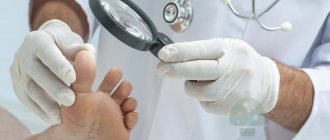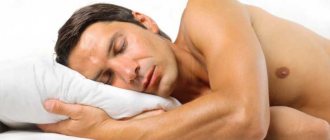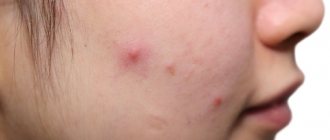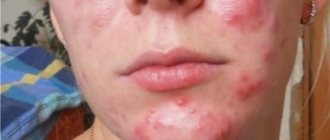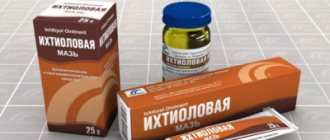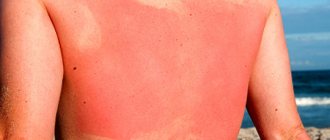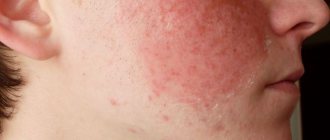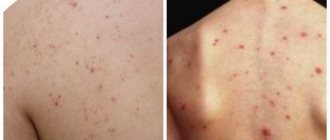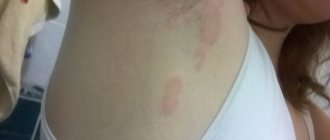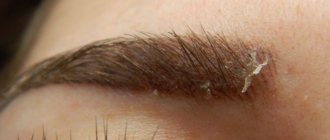Features of excessive sweating in men
Another name for the pathological process is hyperhidrosis . Heavy sweating occurs when more secretions are released than is necessary to cool the body. Normally, sweating in men occurs during excessive physical exertion, in hot weather or in a stuffy room. The glands also work in an enhanced mode during illness, when the body temperature is elevated. In this case, sweat also performs the function of thermoregulation and also helps remove toxins from the body.
We can talk about the development of hyperhidrosis when excessive sweat production is observed without the influence of physical factors. Not only a change in the amount of secreted secretion, but also its composition (when sweat becomes foul-smelling) is considered pathological.
Hyperhidrosis is considered excessive sweating without the influence of physical factors.
What is associated with hyperhidrosis of the whole body and its individual parts?
Excessive sweating can occur throughout the body or on individual parts of it: the head, arms or legs.
If your limbs or head sweat a lot, this is most often due to temporary disruptions in the body or severe stress. Such problems rarely become a symptom of disease. There are several reasons why there is heavy sweating throughout the body:
- Rare episodes of sweating. This is due to temporary disruptions in the body.
- Increased sweating continues for quite a long period. This may indicate serious health problems.
If you suspect that the cause of increased sweating is some kind of disease, be sure to get examined by a doctor so that he can make an accurate diagnosis. Only after this can treatment begin.
Types of male hyperhidrosis
Hyperhidrosis can be:
- General (profuse sweating is observed over the entire surface of the body);
- Local (excessive sweat production is observed in certain areas).
Patients prone to emotional stress and neuroses often develop hyperhidrosis of the palms or feet. Some are characterized by an inguinal-perineal form of increased sweating (scrotal hyperhidrosis). In addition, asymmetric hyperhidrosis can occur, when the work of the sweat glands is disrupted on only one side of the body.
According to the severity of increased sweating in men, there are:
- Easy degree. Sweating is increased, but does not cause discomfort to the patient, he can lead a full life.
- Average degree. The patient develops some social problems. Thus, a man with palmar hyperhidrosis experiences awkwardness when shaking hands.
- Severe degree. Sweat is released so intensely that the patient tries to avoid any social contacts.
If hyperhidrosis develops for no apparent reason, it is called primary. Often, increased sweating in men is observed against the background of other diseases. In this case, we are talking about secondary hyperhidrosis, which is more susceptible to men after 45 years of age.
Along the flow they distinguish:
- Permanent hypergyrosis. The pathological process does not depend on the time of year and environmental factors.
- Seasonal hyperhidrosis. An exacerbation is observed in the warm season.
Often, excessive sweating in men occurs only in the morning. More problems arise when hyperhidrosis occurs during the day. The patient begins to experience psychological discomfort and suffers from avoiding close contact with colleagues and friends.
Lucy Frey syndrome is a form of localized hyperhidrosis. Another name for the pathology is “gustatory sweating.” The disease is characterized by increased sweating of the facial skin during meals. The problem often develops after surgery on the parotid gland.
Sweating head
It can be primary and secondary. The primary one has not been fully studied; scientists cannot say why a man aged 20 to 50 years has problems associated with a disorder of the sweat glands located on the head. Many experts associate the appearance of symptoms of primary hyperhidrosis with a hereditary predisposition. Under normal conditions, such a reaction may be associated with the presence of thick and long hair. It disrupts heat exchange, so the pillow is often wet in the morning. In such a situation, the hair quickly becomes dirty and an unpleasant odor appears. Because of this, the patient constantly feels awkward, he becomes constrained and irritable.
Secondary hyperhidrosis of the head is a consequence of:
- hormonal imbalances;
- disorders of the autonomic nervous system.
With severe sweating, identifying the cause helps to draw up therapeutic regimens. The patient’s condition can be alleviated by eliminating the main provoking factor.
Causes and factors for the development of heavy sweating in men
Representatives of the stronger sex are more susceptible to developing hyperhidrosis due to increased levels of the male hormone - testosterone . The more of this substance in the body, the more sweat a man will produce during physical activity or during the hot season. Hereditary factors are also of great importance. The amount of sweat produced directly depends on the number of sweat glands. In some cases, hyperhidrosis is a consequence of the individual characteristics of a particular man’s body.
Factors contributing to the development of pathological sweat may also include:
- Wrong wardrobe selection. Tight shirts made of synthetic fabric lead to an increase in the amount of sweat produced in the armpits. Poor quality underwear can cause scrotal hyperhidrosis.
- Excess weight. The fat layer contributes to overheating of the body. In addition, a large mass can cause endocrine disorders.
- Lack of quality hygiene. This is especially true for foot hyperhidrosis. Regular washing of feet and proper care of shoes - these measures will help avoid unpleasant symptoms.
- Taste preferences. Hyperhidrosis is often observed in men whose diet is rich in carbonated drinks, spicy foods and spices.
Obesity can lead to the development of hyperhidrosis
If hyperhidrosis is not a consequence of any disorders in the body, you can get rid of unpleasant symptoms by changing your lifestyle.
Main reasons
Now let’s look in more detail at the main reasons why sweating may increase in men.
Testosterone
If for some reason testosterone decreases in a man’s body, a problem with sweat may also indicate this. In addition, low testosterone also manifests itself in these symptoms:
- Sudden tachycardia (rapid heartbeat).
- The appearance of “feminine” characteristics in a male body.
- Reduced muscle mass.
- Psychological disorders.
- Problems with the genitourinary system.
Even if you have found some of the described symptoms, a final conclusion about low testosterone can be made only after passing the appropriate tests.
A decrease in testosterone in men most often appears after 40 years. But such problems can also happen at a younger age.
Hangover
When a lot of alcohol is drunk, the circulatory system malfunctions and the liver cannot adequately synthesize toxins.
This leads to an increase in temperature. In order to somehow normalize its condition, the body begins to actively produce sweat. Heavy sweating most often occurs during sleep and can cause dehydration. It is enough to wait a few hours, and alcohol poisoning will go away on its own. The main thing is not to forget to drink enough liquid at this time.
Heavy sweating at night
If sweating catches a man in his sleep, this can happen for the following reasons:
- If the body temperature is elevated and there is excessive humidity in the room.
- If the bed is made of linen made of synthetic material that does not allow enough air to pass through.
- If you use a very warm blanket made of natural materials.
- If a man drank coffee, soda, or spicy food before bed. All of these foods can increase blood circulation.
These reasons lead to episodic sweating. If a man wakes up sweating every night, this may indicate serious health problems, which we will discuss further.
What diseases are caused?
Health disorders that can cause excessive sweating can be divided into four main groups:
- Problems with the endocrine system.
- Neurological disorders.
- The appearance of tumors.
- Infections.
Problems with the endocrine system
Disturbances in the functioning of the endocrine system lead to various diseases.
Sometimes a man may not even be aware of them until he starts looking for the cause of increased sweating, which is only a symptom of some disorder.
Diabetes mellitus type 1 and 2
With this disease, sweating can manifest itself in three different forms:
- Appear suddenly, without any apparent reason.
- After eating certain foods, my face and neck sweat.
- Appears at night, against the background of a decrease in insulin levels.
Thyrotoxicosis
This disease causes increased production of thyroid hormones , causing body sweating to appear as an additional symptom in the later stages of the disorder.
Anemia
This disease is characterized by a decrease in hemoglobin in the blood. If the patient is exposed to regular physical activity, this causes increased sweat production and shortness of breath.
Hepatitis
Increased function of the sweat glands often accompanies various viral hepatitis.
Neurological disorders
Neurological disorders are characterized by increased stimulation of the sympathetic nerves. Excessive sweating is a symptom of the following diseases:
- Parkinson's disease.
- Stroke.
- Riley-Day syndrome.
Tumors
Frequent sweating in large quantities may indicate the appearance of these tumors in the body:
- Pheochromocytoma.
- Tumors of the nervous system.
- Cancerous tumors.
Infections
Increased sweating always accompanies infections entering the body. This is especially true for the following disorders:
- Tuberculosis.
- Inflammation of the bronchi.
- Malaria.
- Diseases accompanied by purulent formations.
- Septicemia.
- Brucellosis.
Symptom or disease
High sweating may indicate the development of serious pathological processes in the body. This may include:
- Diseases of the endocrine system such as diabetes, hypoglycemia, etc.
- Infectious diseases. Tuberculosis is often the cause of hyperhidrosis in men.
- Cardiovascular disorders. In patients over 45 years of age, excessive sweating may be a consequence of coronary heart disease or hypertension.
- Infestation with parasites. The waste products of pathogenic microflora come out with sweat.
- Diseases of the genitourinary system. Scrotal hyperhidrosis is often observed in men with prostatitis. An unpleasant symptom can also be a concern with pyelonephritis or urolithiasis.
- Oncological diseases.
- Venereal diseases. Increased sweating can occur with syphilis, gonorrhea, and chlamydia.
- Neurological diseases
You can judge that you have encountered secondary hyperhidrosis by the accompanying symptoms. If, in addition to increased sweating, you are worried about weakness, frequent headaches, or discomfort when urinating, you should immediately consult a doctor.
Which specialist to choose
Remember that self-medication is dangerous to your health.
- If hyperhidrosis has developed against the background of a pre-existing disease, then you should consult a specialist.
- An endocrinologist will help you with diabetes and thyrotoxicosis.
- Therapist in case of pathology of the cardiovascular system.
- If you have a history of tuberculosis or suspect it, immediately contact a phthisiatrician; perhaps the disease has reappeared in the acute stage or is proceeding in a latent course.
- If you have a tumor or a hereditary predisposition to it, contact your oncologist.
- A geneticist, if excessive sweating is inherited.
- An infectious disease specialist, if there is frequent and spasmodic fever, to rule out an infectious disease. The doctor will prescribe treatment according to the etiological factor.
- Nutritionist for excess body weight. He will help you choose the right diet based on your daily calorie needs and diet.
- Psychologist in case of profuse sweating during neuropsychic stress.
- A surgeon in the absence of a positive therapeutic effect from medications.
Diagnostics
In case of increased sweating, a specialist makes a diagnosis based on information received from the patient (history collection), excluding concomitant diseases. The following techniques allow you to accurately identify the causes of the pathological process:
- Patient interview. The specialist finds out when the first symptoms of hyperhidrosis appeared and what preceded them.
- Examination of the patient. Peeling of certain areas of the body may indicate local hyperhidrosis.
Only a doctor can determine the exact cause of hyperhidrosis.
To identify endocrine, infectious and tumor causes of hyperhidrosis, the patient is prescribed the following types of differential diagnosis:
- General blood analysis. The technique allows us to detect the presence of an inflammatory process in the body.
- General urine analysis. The study makes it possible to exclude kidney disease.
- Wasserman reaction. The study allows us to exclude syphilis.
- Blood test for hormones.
- Ultrasound of the prostate. The study allows us to identify the presence of morphological changes in the prostate gland.
- MRI. The technique allows us to exclude oncological pathologies in a man’s body.
Only comprehensive diagnostics makes it possible to accurately determine the cause of pathological sweating. Additionally, a man suffering from hyperhidrosis may need to consult a neurologist or psychotherapist.
Traditional medicine recipes
The effect of drug therapy can be enhanced using traditional medicine.
To combat hyperhidrosis, experts recommend using:
- Soda solution. It is prepared as follows: a tablespoon of baking soda is dissolved in a glass of boiling water. The sweating area is treated with soda water two to three times a day. This procedure reduces sweating and eliminates unpleasant odor.
- Decoction of pine branches. Young shoots are brewed with boiling water and simmered in a water bath for another half hour. The finished product is used for compresses. Gauze, folded in several layers, is dipped in it and applied to problem areas.
- Infusion of oak bark. To prepare it, take 200 grams of dry raw materials, add 500 ml of boiling water, and leave the infusion for 24 hours. Experts recommend their patients to use it for baths or as lotions.
- A contrast shower helps get rid of sweating. It must be done several times a day.
- It is better to wipe sweaty palms with apple cider vinegar or lemon juice.
- Teas with lemon balm or sage help get rid of night sweats.
If medication and folk treatment do not help, the patient may be offered radical methods of getting rid of sweating.
These include:
- removal of an area of skin in the area of which increased sweat secretion occurs;
- removal of sweat glands;
- lipoxation;
- sympathectomy.
The problem cannot be ignored. Excessive sweating in rare cases is a cosmetic defect; in most situations it signals serious health problems. Untreated hyperhidrosis leads to psycho-emotional disorders: a man tries to limit communication with the outside world, withdraws, becomes depressed and irritable. Local sweating creates favorable conditions for the development of bacterial and fungal infections.
Treatment
Therapy for secondary hyperhidrosis is aimed primarily at eliminating the cause of increased sweat gland activity. Treatment of the underlying disease identified during the diagnostic study is carried out.
Drug therapy
To eliminate an unpleasant symptom (increased sweating), the following groups of medications can be used:
- Sedatives. These medications calm the patient’s nervous system, as a result of which the manifestations of hyperhidrosis are observed to a lesser extent. The patient may be prescribed tinctures of motherwort or valerian. The drug Persen also shows good results.
- Tranquilizers. Drugs from this group are used if excessive sweating is the result of excessive excitability. An unpleasant symptom can develop after severe stress or prolonged depression. The patient may be prescribed the drug Phenazepam.
- Belladonna alkaloids. These are atropine-based drugs that suppress excessive sweating. Bellaspon or Belloid may be prescribed. Medicines from this group can lead to the development of serious side effects, so they should be used strictly on the advice of a specialist.
- Gels and ointments for external use. With their help, it is possible to reduce sweating and remove unpleasant odors. Formagel and Teymurov's paste help achieve good results.
- Vitamins. This therapy allows you to improve the functioning of the nervous system and strengthen the body's defenses.
Modern methods of treating various types of hyperhidrosis include Botox injections. The drug blocks the nerve endings responsible for sweating. The effect of the procedure lasts from 6 to 10 months.
Medications for hyperhidrosis - gallery
Phenazepam is a drug from the group of tranquilizers
Formagel is an effective remedy against excessive sweating
Persen calms the nervous system
Nutrition
It will be possible to improve the effect of therapy for the underlying disease, as well as reduce sweating, if you adjust your diet . There is no need to adhere to a strict diet, but you will have to give up some foods. This primarily includes high-calorie foods high in fat. You will have to limit your consumption of fast food, factory-made juices and carbonated drinks. The work of the sweat glands increases after drinking alcohol, coffee, and too spicy foods.
Proper nutrition will help reduce the symptoms of hyperhidrosis
Men with hyperhidrosis will benefit from foods containing large amounts of B vitamins. The diet must contain eggs, beans, lean meat, liver, and whole grains. Calcium is also necessary for the normal functioning of the sweat glands, so it is not advisable to limit the consumption of fermented milk products.
You should definitely eat fresh vegetables and fruits. There is no need to limit your drinking regime. Preference should be given to clean, cool (not ice!) water.
Physiotherapy
Using physical methods of influencing problem areas, excellent results can be achieved. The following techniques can be used in combination with the main treatment:
- Iontophoresis. Thanks to a low-power direct current, medicinal substances are introduced into the patient’s body to stabilize the functioning of the nervous system.
- Therapeutic baths. The most effective are procedures using carbon dioxide.
- Magnetotherapy. The procedure improves blood circulation and normalizes metabolism.
Therapeutic baths are an effective means of combating excessive sweating
Unfortunately, physiotherapeutic techniques cannot always be used due to the presence of concomitant symptoms of the underlying disease.
Surgical intervention
In severe cases of hyperhidrosis, when the patient experiences severe psychological discomfort and cannot lead a full life, surgical treatment of the disease is indicated. There are several surgical options:
- Sympathectomy. During the operation, the specialist acts on the sympathetic nerve trunk with an electric current or crosses the nerve responsible for sweating. Surgical intervention can be performed with complete destruction of the sympathetic nerve trunk or its partial blocking with the possibility of subsequent recovery.
- Endoscopic surgery. The technique allows local action on the sweat glands with minimal trauma. After endoscopic sympathectomy there are no scars in the affected area. Within a few hours after surgery, the patient can go home.
- Excision of skin in the area of increased sweating. Such operations are performed only for local hyperhidrosis (most often in the armpit area). Liposuction can also be performed to remove fatty tissue along with sweat glands.
Surgery is indicated for severe hyperhidrosis
Using surgical methods, you can effectively solve the problem of increased sweating in men. You should be prepared for the possibility that unpleasant side effects may occur. For example, after sympathectomy, compensatory hmyperhidrosis often develops - sweating appears in other parts of the body. And excision of the skin of the armpits leads to restrictions in movement; the patient cannot fully raise his arms up.
Traditional methods of treating hyperhidrosis
It will not be possible to eliminate the main cause of increased sweating using traditional medicine recipes. However, some methods will significantly reduce the manifestation of an unpleasant symptom.
Melissa
The plant calms the nervous system, resulting in a decrease in sweating. It is recommended to prepare tea with lemon balm - pour boiling water over several fresh leaves and drink after the drink has cooled.
Mint
For hyperhidrosis of the whole body, peppermint baths help well. 200 g of dry plant are poured with a liter of water and boiled over low heat for about 5 minutes. The finished broth is filtered and added to the bath.
Oak bark
The raw materials are also used for medicinal baths. Pour 100 g of bark into a liter of boiling water and cook over low heat for about 20 minutes. Then the product is filtered and used for hygiene procedures. The effect of such a therapeutic bath can last for several days.
Ammonia
A teaspoon of alcohol must be diluted with a liter of clean water. The resulting lotion is used to treat problem areas twice a day - morning and evening.
Lemon juice
The fruit can also help control sweating. Freshly squeezed juice should be used to periodically treat problem areas. It is worth considering that the product can provoke the development of allergies.
Folk remedies for hyperhidrosis - gallery
Lemon juice helps reduce sweating
Ammonia is used to treat problem areas
Mint is an inexpensive and effective remedy against hyperhidrosis
Melissa tea calms the nervous system
Oak bark baths reduce sweating
Night sweats
If a man sweats a lot at night, this may indicate a depressed mental state. The fact is that representatives of the stronger half of humanity prefer to keep all their experiences to themselves; as a result, emotions accumulate and spill out only during sleep. This explains why nightmares are so common, causing a person to wake up in a “cold sweat.” To eliminate this phenomenon, you need to take a course of sedatives. Normalizing the functioning of the nervous system allows you to stop nocturnal hyperhidrosis.
Another reason for night sweats may lie in the sluggish course of a viral or bacterial infection. Symptoms of a cold (if they are viruses) or the presence of boils on the body (if they are bacteria) can indicate its presence. A similar situation often occurs with hidden inflammatory processes characteristic of tuberculosis, endocarditis, syphilis, and osteomyelitis. There are about 170 diseases that can cause night sweats in men. A complete diagnostic examination helps identify them. Studying the following table allows you to understand what is happening to the body and which doctor to contact to eliminate the problems that have arisen.
| Name of pathology | Additional symptoms | Who to contact |
| Hyperthyroidism | In addition to night sweats, a person experiences trembling hands and rapid heartbeat. The patient becomes irritable and constantly loses weight | See an endocrinologist |
| Hypoglycemia | Along with excessive sweating, a person suffers from weakness, dizziness, and headache. He may experience visual and speech disturbances, confusion, loss of orientation in space | See a therapist or endocrinologist |
| Obstructive sleep apnea syndrome | Holding your breath during sleep often causes excessive sweating, high blood pressure, heart problems, and chronic fatigue. | To a somnologist, to a therapist |
| Tumors (Hodgkin's lymphoma, pheochromocytoma, leukemia, carcinoid syndrome) | Hot flashes, diarrhea, bronchospasms, abdominal pain, anemia, intoxication syndrome | To an oncologist |
| Testosterone deficiency | Decreased sex drive, the appearance of soreness in the mammary glands, reduction in the size of the testicles, body weight, muscle strength, sudden sweating, feeling hot, insomnia, loss of vital energy | See a therapist |
Increased sweating and a change in the smell of the secreted fluid may also indicate the course of a particular disease. The appearance of an unusual aroma occurs due to a violation of chemical reactions occurring inside the body. An experienced doctor often uses this characteristic feature to make a preliminary diagnosis.
The smell of acetone and rotten fruit indicates the development of diabetes.
A sour aroma indicates a disruption of the autonomic nervous system and a lack of important microelements.
A plume of ammonia appears in a sweating person if he has kidney problems. Poor urine output, gray skin tone, and problems with the skeletal system help confirm the suspicion.
The smell of stale beer appears in a person suffering from tuberculosis. The man is constantly tormented by a persistent cough and chest pain. Against this background, constant weight loss occurs while maintaining the same diet.
The aroma of fresh bread is a symptom of typhoid fever. This disease has characteristic symptoms: high fever (which causes excessive sweating), headaches, general deterioration in health, and a rash on the chest in the form of light pink spots.
Treatment prognosis and prevention
If you seek medical help in a timely manner and follow all the specialist’s recommendations, the prognosis is favorable . In the most difficult cases, the problem can be solved through surgery.
Sweat is an ideal environment for the development of fungi, bacteria and other pathogenic microorganisms. Lack of therapy can cause dermatological diseases.
In order not to encounter the problem of increased sweating again, you should follow simple preventive measures, which include:
- rejection of bad habits;
- proper nutrition;
- refusal of clothing made from synthetic materials;
- compliance with hygiene rules.
General measures to combat sweat
You can successfully fight sweat. You need to start by eliminating external provocateurs. What can be done for this?
- Control the temperature in living areas. It should not be higher than 23 degrees.
- Take a shower every morning and evening.
- Wear clothes that fit according to the season, made from natural fabrics.
- Regulate your diet, exclude spicy foods, seasonings, spices, garlic, onions, strong tea and coffee from your diet.
- Stop drinking alcohol and smoking.
- Learn to control your emotions and not get nervous.
- Reduce physical activity (if it is high).
At the same time, we try to take proper care of our skin.
Today, modern cosmetology offers a whole series of products that allow you to control excessive sweating.
1. Antiperspirants. They are suitable for combating excessive sweating of the armpits. These drugs contain farnesol and triclosan. Their effect helps block sweat production.
2. Medicinal deodorants. Used to eliminate odor. They contain components that can effectively fight bacteria.
3. Cosmetic talc. Used to treat sweaty feet, its effect is similar to that of antiperspirants.
4. Special gaskets. They are glued to the back of the clothing, in the place where the item comes into contact with the area of profuse sweating. The pads absorb excess moisture. In this way, an optimal temperature balance is maintained.
If the measures taken do not help, you should seek help from specialists. First, see a therapist; after the examination, he will, if necessary, refer you to other specialized doctors.
general characteristics
Excessive sweating is a subjective complaint: patients notice that they sweat more than other people.
A person finds wet stains from sweat on clothes, not only in the armpits, but also on the chest or back. Sweating is combined with cold skin and an unpleasant, pungent odor that can be easily felt from a distance. Patients may note that a large amount of sweat appears only on certain parts of the body - for example, on the palms and soles of the face. Increased sweating is provoked by stress, minor physical activity, and food intake. The symptom also causes psychological disorders: the person begins to experience a feeling of shame, discomfort, and avoid contact with others. Great inconvenience is caused by excessive sweating of the palms, which interferes with professional activities and makes it difficult to meet people and shake hands. A short-term increase in sweat production in response to physical labor or emotional shock is considered normal, but persistent hyperhidrosis, which disrupts the quality of life, is an indication for contacting a specialist.
